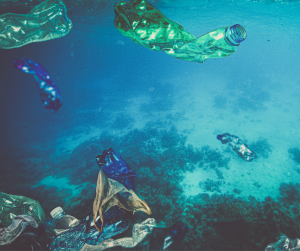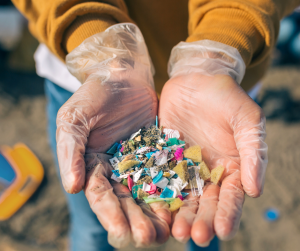“Clean Ocean, Clean Drinking, Clean Conscience”
Earth, our blue home, our responsibility, is drowning in tossed-away plastic that is devastating our marine wildlife and life-giving oceans. A crisis so severe that the idea of our planet without plastic is unimaginable, impossible. Nevertheless, there are people alive today who were born into a world remarkably, almost free from plastic. It is astounding how quickly and drastically our planet has changed in just over a century.
In the mid-1800s, the search for a new material to replace precious, expensive ivory started. Plastic was inexpensive and rapidly gained popularity. Skip ahead to World War II, plastic production grew nearly fourfold. After the war, plastic companies shifted from manufacturing military equipment to producing water bottles. By the early 50s, plastic bottles cheaper, lighter and easier to ship, began to replace glass for commercial use.
Unbelievably, half of all plastic ever manufactured has been made in the last 15 years. Granted, plastic has modernised medicine and put people into space, but what was once a solution is now a problem.

The convenience plastic offers us has led to a throwaway culture. Today, single-use plastics account for 40 per cent of plastic produced every year. Water bottles, wrappers and carrier bags; items we use for a few moments, exist for generations to come.
Every single piece of plastic ever made still exists. In 1997, when Captain Moore sailed from Hawaii to California, he discovered the Great Pacific Garbage Patch. Swirling ocean currents suck in plastics creating a garbage gyre, now, three times the size of France and with its own developing coastal ecosystem. It is one of five great oceanic garbage patches. As much as 80% of the plastic found in our oceans is transported from the land by rivers.
Plastic pollution is most visible in less-wealthy Asian and African nations, where rubbish collection systems are often inefficient or non-existent. Annually, 8 million tonnes of plastic waste are dumped into our oceans. This is equivalent to a truckload every 60 seconds. This is catastrophic for our oceans and their fragile ecosystems. We face nothing short of a global plastic crisis.
Introducing, NEO WTR. Some very clever people are doing something about the plastic pollution crisis. Their philosophy: there is plenty of plastic already in the world, so why create more?
NEO WTR’s mission video from their website.
NEO WTR are the first drinks brand in Europe to use 100% prevented ocean plastic to make their eco-friendly water bottles. Plastic is recovered from at-risk coastlines in Indonesia, the world’s second-largest contributor to ocean plastic pollution. 17,000 islands make up Indonesia. That is a lot of coastline. The proximity of plastic waste to the ocean, therefore, is typically a short distance. Largely, these islands have non-safe drinking water. Their safe alternative is virgin water bottles. Without any recycling management in place, tossed bottles reach our oceans fast. This poses a huge threat to the ocean and marine wildlife. The forecast predicts that by 2050, our oceans will be home to more plastic than fish.
Thanks to NEO WTR’s prevented ocean plastic clean-up and ocean-friendly packaging, these vulnerable coastlines not only benefit from new recycling management but also the economic opportunities for local communities.
NEO WTR is a superior quality British spring water, bottled at its source in Somerset, UK. High in minerals and filtered through organic land with a fully recyclable bottle, label and cap, NEO WTR is an extremely worthwhile product. As they say, “Clean ocean, clean drinking, clean conscience.”

We commend NEO WTR on their plastic pollution prevention, sustainable packaging and sustainable innovation and their unwavering commitment to protecting our planet. Your efforts resonate deeply with our values and mission.
Earth, our blue home, our responsibility, is finally taken seriously.
Say hello
Get in touch or come for a visit
